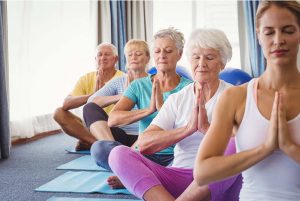We’ve all experienced the feeling, haven’t we?
One minute we are in our 20s, partying every weekend and burning the candle at both ends. And then suddenly we are in our 50s and the risk of putting your back out when you sneeze is starting to become very real!
Ageing is a part of life that happens to all of us. Whilst some people try to cling on to their 20s, it is important to recognise that like a fine bottle of wine, you can improve with age. All you need to do is to care for yourself properly.
Growing older should be about wanting to live your best life. It should also be about ensuring you have the physical and mental well-being in order to do so.
In this article we will show you how best to do that, with our tips on how to stay on top of life as you age.
-
Mind your diet
As you get older your diet takes on increased significance with regards to maintaining your overall level of healthiness.
While you might be partial to big juicy steaks, a nice fry up and calorie rich fast foods, once you hit your 50s you should be mindful to adopt a healthier and balanced diet.
Try to eat your serve of 5 fresh vegetables and 2 fruits a day. Also reduce your intake of red meat, in favour of more lean proteins like fish, chicken and beans.
It is a good idea to alternate between eating bread, rice, pasta and whole grain cereals every day too. While you should also be trying to include low-fat, or fat-free, dairy products like milk, cheese and yoghurt into your diet.
Other things you should do is try to reduce your intake of carbs, salt, processed foods, unhealthy fats, refined sugars and of course, calories.
While the thought of making wholesale changes to your diet might seem quite discerning. The key phrase to remember here is ‘balanced’.
There is nothing wrong with treating yourself to the occasional Big Mac or Full English, just don’t make it every day.

-
Exercise
As well as eating healthier you need to ensure you stay active and exercise more.
Regular exercise is a critical factor in lowering your susceptibility to heart disease, cancer and other infections.
It can also enhance your mood, lower stress levels, improve your sleep, make you more mobile and increase your bone and skin health too.
The National Health Service in the UK, recommends adults over the age of 65 should do at least 150 minutes of moderate intensity activity every week.
This could include the likes of walking, running, swimming, yoga, aqua aerobics, cycling or dancing. All of which will give you a cardio workout, as well as helping to strengthen muscles and improve your balance. If you’re not motivated because of certain issue try listening to music or download your favorite fitness apps, this will really help boosting your motivation when doing exercises everyday.

-
Stress less!
The consequences of stress on your body can range from an increase in wrinkles, and other premature signs of ageing, to a greater risk of heart disease. So, it is important to try and reduce your stress levels as you get older.
There are several ways you can do this, including listening to music. While relaxation techniques like yoga, breathing exercises and meditation have all been proven to work too.
In addition, getting adequate sleep, exercising regularly, and laughing with friends and family, are all good ways to reduce stress too.
-
Focus on your mental health
As well as becoming less stressed, you should also focus on your mental health as well.
Being happy and content goes a long way towards helping you to stay on top of life as you age. So, you should always try to maintain an untroubled demeanour.
To keep your mental health in good working order, try and spend time regularly with family and friends.
It is important to maintain strong connections with people, otherwise you could risk feeling isolated and lonely. If these people live a far distance from you, be sure to phone, or better still, web call them regularly, as you will at least still see them.
Consider getting a pet too. As it has been suggested that people with cats or dogs, have lower blood pressure and less stress levels. As well as enjoy better overall moods and less bouts of loneliness, than those who don’t have them.
It is also well worth taking up new hobbies that will bring extra meaning to your life. This could include everything from photography and painting, to blogging or volunteering for a charity.
You might even want to travel a bit more.
-
Quit smoking and drink less alcohol
While you might have thought it was cool to smoke a pack a day. Or down double-digit numbers of drinks on a Friday or Saturday night out back in your 20s. It most certainly is not now. So, it’s time to quit smoking and drink less in the way of alcohol.
The effects of both smoking, and alcohol consumption, have been repeatedly shown to facilitate premature signs of ageing, and a significant increase for the potential of disease.
While quitting smoking can be very hard, there are several resources you can draw upon to help you. Although, your first port of call should be your doctor.
With regards to alcohol, try to stick to one drink per day for women, and two for men. Though if you can go a day or so without drinking a beer or wine, then all the better.

-
Get enough sleep
Getting good sleep is very important for your overall mental and physical health.
Not only has it been proven to decrease your risk of stroke and heart disease, but it can also reduce your potential for obesity, significantly lower levels of depression and stress, and reduce inflammation.
You will also find it gives you improved concentration and focus too.
Ideally you should aim for between seven and eight hours of sleep every night. But if you are struggling to get this currently, consider buying a new bed, wearing earplugs to block outside noise, or listening to relaxing sleep music, to improve your chances of getting good sleep.
Limit your use of mobile phones and other electronic devices, prior to attempting to fall asleep too.
-
Take care of your eyes
Similarly, as you get older it is important to look after your eyes.
As explained by Oscar Wylee, this article outlines how your eyesight can change as you age, why it is important to get your eyes regularly tested and, if you need them, how to choose the right style of reading glasses for you.
-
Drink plenty of water
Staying hydrated by drinking plenty of water is very important.
It helps to regulate your body temperature, prevents you from getting sick, cushions and lubricates your joints and helps get rid of toxins through perspiration, urination and bowel movements.
Regularly drinking water can also help to improve your brain function and energy levels and even keeps your skin healthier.
If you are a woman, try to aim to drink at least 2 litres of fluids a day. Men should aim for around 2.6 litres.
-
Take care of your teeth
As you get older, it is worth paying particular attention to your teeth.
To keep that beautiful smile, you’ll want to keep your teeth for as long as you can!
Be sure to maintain a proper oral healthcare routine that involves brushing for 2 minutes, twice a day, as well as flossing and using mouthwash.
You should also make regular check-ups to see your dentist too. As that is the best way to reduce your risk of gum disease – which has also been linked to an increased risk of stroke and heart disease.
-
See a doctor regularly
Lastly, as you get older, it is important to schedule regular check-ups with your doctor. After all, you do it for your car, when you put it in for service at the mechanic. So why not do it for yourself?
Regularly seeing your doctor for a check-up every 6 months or so can help you stay on top of life as you age.
It can also identify any potential health issues you may have before it develops into something serious, and will also give you peace of mind to know that you are in good health overall.




